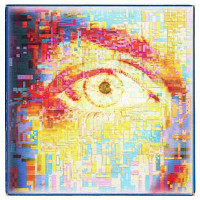Today, we are talking about the language of perception. Our language itself arose from the behaviour of our perceptual faculties. We even created a form of sign, when we began to really understand the deaf, that would allow them to approximate our own communicative range. But as much as perception encompasses our grasp of language, it goes deeper than that as well.
We tend to think things like, “I like that” or “I hate that.” We form many of our judgements in language, but only after they have been filtered by our perception. Some even make statements like, “Everybody likes pizza”, and while it may be true that many people like pizza, the range of perceptual experience is so vast that someone might not only dislike pizza for one reason or another, they may find it nauseating.
To be honest, I struggle to understand the perception of a neurotypical person. For me, nothing is really background noise. Everything stands out, and this shows up in my behaviour as perceptual patterns show up in everyone’s behaviour. I remark on things that people consider silly or obvious because my perception doesn’t make the distinction between the everyday and the meaningful. My brain will seize on someone shouting the word ‘shoe’, and I mull that over for quite a while, potentially, even if it really had very little meaning at all.
Everyone’s perceptual profile affects their personality as well as affecting their language, body language as well as spoken. Some people use constrained hand gestures, very small movements. For them, things seem very focused, simple and clear. Other people use what some might call wild hand gestures. For them, things seem very complex, grand and dramatic.
Perhaps the most complicated part of this is that no one is wrong. For you, things really are as you perceive them. For the colour blind, concepts of colour are abstract notions. They may find talking about it somewhat interesting, but in the end, they will identify things more by some other quality than by what colour they are.
In my experience, the colour blind tend to be really good listeners. I can ask them about a person with my description mostly focused on what their voice sounds like, and it will make perfect sense to them. If I start saying things like brown hair and blue eyes, well, I would be wasting my time and theirs as well. This is a dramatic example of perceptual gap, but this perceptual gap exists to some degree between all of us.
The key to communicating with someone is understanding their perception? Exactly.
I found this to be the biggest hurdle in script writing. As soon as I described a characters age or appearance, I immediately bored myself. Yes. Maybe I should start with motivations? Even motivations are shaped by perception.
There is a big range in the kinds of sound people enjoy. Some enjoy complex rhythms, others consider them unpleasant noise. Really, it’s the one facet of human experience where we stand the best chance at finding common ground, but so far would you say we really know how to start there? Too much is assumed. Too much tendency to say everybody likes this, or nobody likes that.
Most stay locked into their way of seeing things. And that can lead to chronic stress injury of the nervous system. Those factors that govern perception in the first place.
There’s a commitment involved in assessing other people’s motivations and acting against them if they counter the truth of ones own motivation. A big part of that would be that people in general think the task to be just too difficult when it’s not really difficult at all. Watch a person carefully for even just fifteen minutes, and you can learn a lot about their motivation based on how they react to things they perceive in their environment.
Your thoughts are welcome. Be well friends.
Travis Saunders
Dragon Intuitive
~science,mysticism,spirituality~

